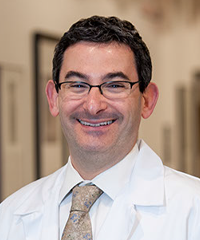Oncology
Relapsed/Refractory Diffuse Large B-Cell Lymphoma
Investigational and Emerging Therapies for Diffuse Large B-Cell Lymphoma
Overview
Several newer therapies for relapsed/refractory diffuse large B-cell lymphoma (R/R DLBCL) are now available, and other agents that are under investigation are beginning to show great promise. Treatments of interest include antibody-drug conjugates (ADCs), bispecific antibodies, and novel chimeric antigen receptor (CAR) T-cell therapies.
What do you make of the emerging treatments for R/R DLBCL and those in clinical development?
Brad Kahl, MD
|
|
“It is an exciting time to be a lymphoma investigator, as there are many treatments emerging and many promising agents in development.”
Just in the last few years, we have seen the US Food and Drug Administration approval of several treatments that are not curative-intent therapies but are nonetheless very useful to have, perhaps especially in patients who are not proceeding to CAR T-cell therapy. In this category, we have regimens such as polatuzumab vedotin plus bendamustine and rituximab (Pola-BR); the CD19-directed monoclonal antibody (mAb) tafasitamab in combination with lenalidomide; and the CD19-targeted mAb loncastuximab tesirine, which is conjugated to the cytotoxic DNA-damaging agent pyrrolobenzodiazepine. Loncastuximab tesirine was granted accelerated approval for R/R DLBCL based on the LOTIS-2 trial, in which the overall response rate was close to 50% and, among responders, the median duration of response was approximately 13 months, which is durable in a very high-risk patient population. Although I do not necessarily believe that these options will be curative and you do have to be mindful of the toxicities that can develop, these are good options for disease control, and I am happy to have them.
In addition, many novel agents are in development. I have been pleasantly surprised by the data with bispecific mAbs in R/R DLBCL. In general, DLBCL is an aggressive, proliferative malignancy, and I just was not sure whether a bispecific mAb approach would achieve significant disease control, but these treatments clearly do. Data for the bispecific mAbs odronextamab, glofitamab, and epcoritamab look promising, and I am excited to see those move forward in DLBCL.
There is also a lot of novel drug development with ADCs and small-molecule–targeted agents. And some of the innovative cellular therapy strategies with dual-targeting and off-the-shelf CAR T-cell therapies could really be a substantial leap forward, assuming that they show good clinical activity and that the manufacturing process is straightforward. We will be quite busy for the next 10 years or so in lymphoma research. It is an exciting time to be a lymphoma investigator, as there are many treatments emerging and many promising agents in development.
Matthew J. Matasar, MD
|
|
“Large-cell lymphoma is a disease that is very often chemotherapy resistant, and the promise held by immunotherapy in this space continues to be really exciting.”
Large-cell lymphoma is a disease that is very often chemotherapy resistant, and the promise held by immunotherapy in this space continues to be really exciting. The bispecific antibodies have demonstrated excellent activity and certainly offer a time to treatment and a convenience factor in terms of their off-the-shelf access that is lacked by autologous CAR T-cell therapy. There are a number of bispecific antibodies that are in development, including mosunetuzumab, glofitamab, epcoritamab, and odronextamab. Each bispecific antibody appears to have a somewhat different profile in terms of activity and toxicity.
Regarding toxicity, we are focused largely on the rate of cytokine release syndrome. The goal is to find the sweet spot of maximizing activity and tolerability, trying to strike the perfect balance. Ongoing clinical trials are also assessing whether these therapies will be used as monotherapy or in the context of combination regimens. Moreover, these treatments are being investigated for a spectrum of BCL, not just DLBCL, and response rates have also been high in most of the indolent BCLs such as follicular lymphoma, not just in large-cell lymphoma. But there continues to be a significant focus on DLBCL because the unmet need is still so great.
Jeremy S. Abramson, MD, MMSc
|
|
“There are also emerging off-the-shelf cellular immunotherapies that are exciting and may avoid the logistics and delay the collecting of T cells needed for CAR T-cell therapy from patients who are heavily treated with chemotherapy.”
The anti-CD19 mAb tafasitamab and the ADCs loncastuximab tesirine and polatuzumab vedotin are the newest drugs in our armamentarium. The next group of drugs—which I think are the most exciting—are the bispecific antibodies, of which there are 4 that are under advanced development, as noted by Dr Matasar: mosunetuzumab, odronextamab, glofitamab, and epcoritamab. These all target CD20 and CD3, but there are differences in their design, so they are all slightly different molecules. We are seeing promising response rates in patients who have relapsed after CAR T-cell therapy, although responses appear to be better in those who have not received CAR T cells. Follow-up is limited, however, so we do not know about durability quite yet.
There are also some newer CAR T-cell strategies that are exciting, including some autologous CAR T cells that target CD19 or multiple tumor antigens, as well as some bispecific CAR T-cell therapies that are in development. For example, the ALEXANDER trial is evaluating a CD19/22 dual-targeting CAR T-cell therapy in combination with pembrolizumab, and the preliminary data look promising. There are also emerging off-the-shelf cellular immunotherapies that are exciting and may avoid the logistics and delay the collecting of T cells needed for CAR T-cell therapy from patients who are heavily treated with chemotherapy. For example, the allogeneic CAR T-cell agent ALLO-501A has demonstrated promising efficacy in patients with R/R LBCL in the ALPHA2 study. In addition, there are some CAR natural killer agents that have shown promising results and are moving into advanced development. These have the appeal of being off-the-shelf products and do not necessarily carry the risk of graft-versus-host disease, which is a theoretical risk of the allogeneic CAR T-cell products. Finally, ADCs that target ROR1 are exciting. ROR1 is expressed in a number of B-cell malignancies, including mantle cell lymphoma and DLBCL, and there are some appealing phase 1 data.
References
Basar R, Daher M, Rezvani K. Next-generation cell therapies: the emerging role of CAR-NK cells. Blood Adv. 2020;4(22):5868-5876. doi:10.1182/bloodadvances.2020002547
Budde E, Gopal AK, Flinn IW, et al. Preliminary results of a phase 1 dose escalation study of the first-in-class IgM based bispecific antibody Igm-2323 (anti-CD20 x anti-CD3) in patients with advanced B-cell malignancies. Blood. 2020;136(suppl 1):45-46. doi:https://doi.org/10.1182/blood-2020-134983
Caimi PF, Ai W, Alderuccio JP, et al. Loncastuximab tesirine in relapsed or refractory diffuse large B-cell lymphoma (LOTIS-2): a multicentre, open-label, single-arm, phase 2 trial. Lancet Oncol. 2021;22(6):790-800. doi:10.1016/S1470-2045(21)00139-X
Duell J, Maddocks KJ, Gonzalez-Barca E, et al. Subgroup analyses from L-Mind, a phase II study of tafasitamab (MOR208) combined with lenalidomide in patients with relapsed or refractory diffuse large B-cell lymphoma. Blood. 2019;134(suppl 1):1582. doi:https://doi.org/10.1182/blood-2019-122573
Hamadani M, Radford J, Carlo-Stella C, et al. Final results of a phase 1 study of loncastuximab tesirine in relapsed/refractory B-cell non-Hodgkin lymphoma. Blood. 2021;137:2634-2645. doi:10.1182/blood.2020007512
Hosseini I, Gadkar K, Stefanich E, et al. Mitigating the risk of cytokine release syndrome in a phase I trial of CD20/CD3 bispecific antibody mosunetuzumab in NHL: impact of translational system modeling. NPJ Syst Biol Appl. 2020;6(1):28. doi:10.1038/s41540-020-00145-7
Hutchings M, Morschhauser F, Iacoboni G, et al. Glofitamab, a novel, bivalent CD20-targeting cell–engaging bispecific antibody, induces durable complete remissions in relapsed or refractory B-cell lymphoma: a phase I trial. J Clin Oncol. 2021;39(18):1959-1970. doi:10.1200/JCO.20.03175
Locke FL, Malik S, Tees MT, et al. First-in-human data of ALLO-501A, an allogeneic chimeric antigen receptor (CAR) T-cell therapy and ALLO-647 in relapsed/refractory large B-cell lymphoma (R/R LBCL): ALPHA2 study. J Clin Oncol. 2021;39(suppl 15):2529. doi:10.1200/JCO.2021.39.15_suppl.2529
Osborne W, Marzolini M, Tholouli E, et al. Phase 1 ALEXANDER study of AUTO3, the first CD19/22 dual targeting CAR T cell therapy, with pembrolizumab in patients with relapsed/refractory (r/r) DLBCL. J Clin Oncol. 2020;38(suppl 15):8001. doi:10.1200/JCO.2020.38.15_suppl.8001
Sehn LH, Herrera AF, Flowers CR, et al. Polatuzumab vedotin in relapsed or refractory diffuse large B-cell lymphoma. J Clin Oncol. 2020;38(2):155-165. doi:10.1200/JCO.19.00172
Wang ML, Barrientos JC, Furman RR, et al. VLS-101, a ROR1-targeting antibody-drug conjugate, demonstrates a predictable safety profile and clinical efficacy in patients with heavily pretreated mantle cell lymphoma and diffuse large B-cell lymphoma. Blood. 2020;136(suppl 1):13-14. doi:https://doi.org/10.1182/blood-2020-136373













